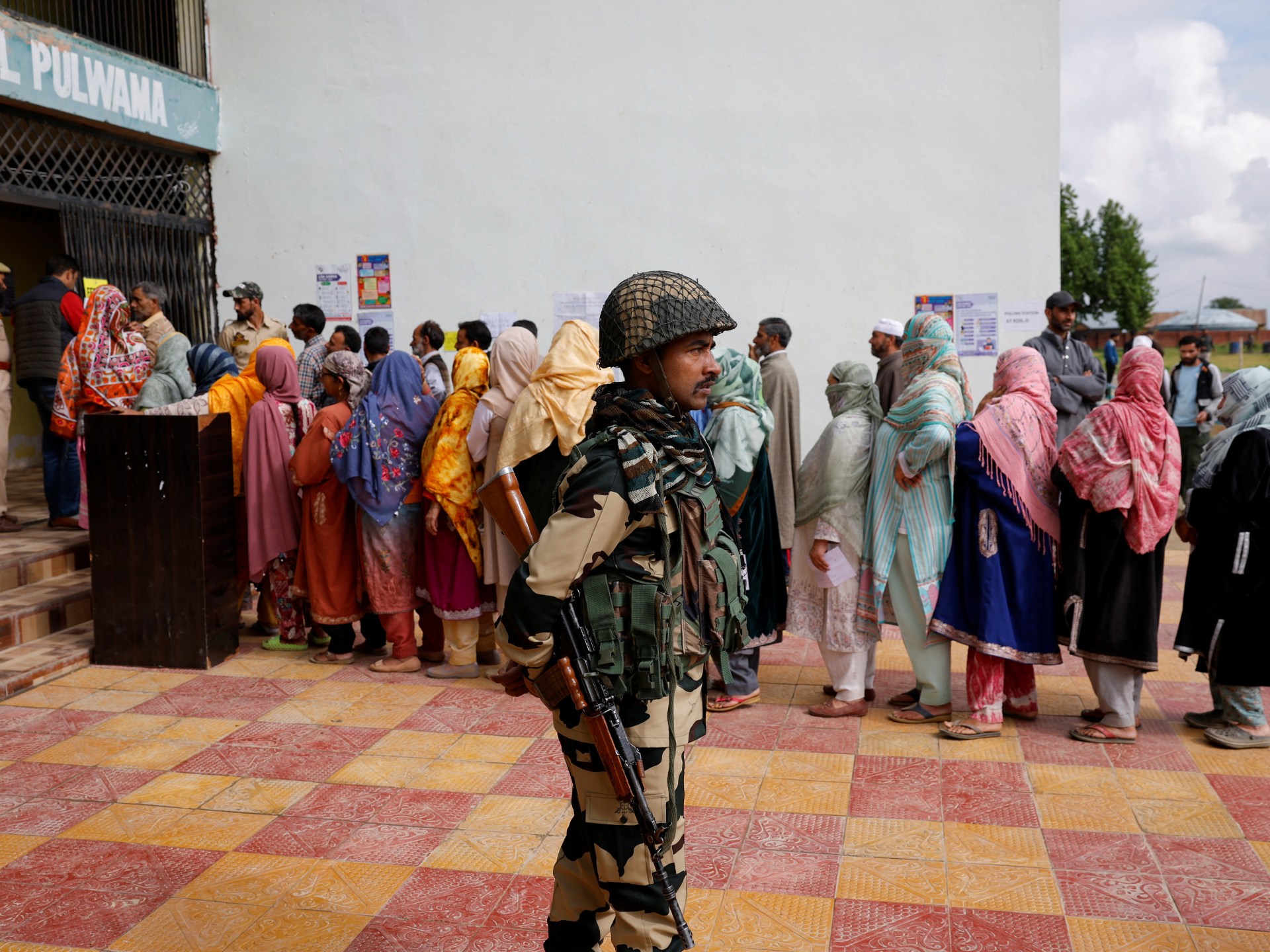India election more than halfway through, Kashmir valley votes in Phase 4

Millions of Indians across 96 constituencies have cast their ballots as the country’s gigantic, six-week-long election edges past its halfway mark.
Monday’s polling in the fourth round of election across nine states and one union territory is pivotal for Prime Minister Narendra Modi, seeking a third straight term but facing the voters’ fury over unemployment and inflation.
Modi’s Hindu nationalist Bharatiya Janata Party (BJP) and its allies are pitted against an alliance of more than two dozen opposition parties, including the main rival Indian National Congress party.
The world’s most populous nation began voting on April 19 in the seven-phase elections in which nearly one billion people are eligible to elect 543 members of the Lok Sabha, the lower house of parliament. The ballots will be counted on June 4.
The vote on Monday for 96 parliament seats largely covered the southern and eastern states of Telangana, Andhra Pradesh and Odisha, where the BJP is not as strong as in the country’s north and west.
Some seats in BJP strongholds in Uttar Pradesh and Madhya Pradesh states also went to the polls on Monday, while crucial seats in Maharashtra and Bihar states, where the right-wing party governs in alliances with regional parties, were also up for grabs in the fourth phase.
With the fourth phase vote, the fate of 379 out of 543 constituencies has been sealed.
Key Kashmir seat goes to polls
Srinagar, the main city in the Indian-administered Kashmir, also voted for the first time since Modi’s 2019 decision to remove the region’s semiautonomy.
According to analysts, the BJP is not contesting there as the outcome could contradict Modi’s narrative of a peaceful, more integrated Kashmir.
“I voted after over two decades … just to get relief from what we are facing here,” said Bashir Ahmad Lala, 67, a Srinagar resident.
Political scientist Christopher Snedden told Al Jazeera the election was significant in the Muslim-majority valley area of the Himalayan region.
“On the one hand, Mr Modi says ‘yes, we want everybody to be part of India’. But on the other, he’s been saying some things that have been a little worrisome to Muslims,” he told Al Jazeera, referring to the Indian leader’s polarising rhetoric in campaign speeches.
In several rallies, Modi has called Muslims “infiltrators” and accused the Congress party of scheming to redistribute wealth from the country’s Hindus to Muslims, who comprise 14 percent of the country’s more than 1.4 billion people.
“And the folks in the Kashmir valley are aware of that, but they are also severely disenchanted with the central government,” Snedden said.

Kashmir has been divided between India and Pakistan since their independence in 1947. Both claim it in full and have fought two wars over control of the Himalayan region. Rebel groups opposed to Indian rule waged an armed rebellion in 1989, demanding either independence or a merger with Pakistan. India accuses Pakistan of backing the rebels, a charge Islamabad denies.
The conflict has killed tens of thousands of soldiers, rebels and civilians.
‘Hindus vs Muslims’
Analysts have raised doubts over whether the BJP and its allies can win the landslide predicted by opinion polls. They also say a lower turnout this year compared with the 2019 election prompted Modi to change the tack of his campaign after the first phase.
In several speeches, Modi has accused the Congress of planning to extend welfare benefits to Muslims at the expense of disadvantaged tribal groups and Hindu castes. Last month, he said the Congress planned to redistribute the wealth of majority Hindus among Muslims, whom he referred to as “infiltrators” who have “more children”.
The Congress has denied making any such promises and has said Modi is rattled by the turnout, which the BJP denies. The opposition party is pitching for better representation and welfare programmes for poor and disadvantaged groups, alleging that wealth inequality has worsened during Modi’s 10-year term.
“Do not get deterred by the diversionary tactics of hateful speeches which divide the society,” Congress president Mallikarjun Kharge said in a message to voters.
About 80 percent of India’s 1.4 billion people are Hindus, but it also has the world’s third largest Muslim population of about 200 million people. Surveys suggest voters are most concerned about unemployment and price rises.
Nikhilesh Mishra, a 42-year-old bank employee in Bihar’s Samastipur district, said: “Raking up issues of Hindus versus Muslims will take us nowhere.”
He said Modi’s BJP-led alliance in Bihar, which secured an overwhelming majority in the 2019 election, had failed to bring development to the state, which is among the poorest in India.
Mishra said rising inflation and unemployment were driving young people to migrate to other states, draining it of its talent. “We want development … This time, we want change in the government.”
“I will vote for someone who is educated and can develop our area,” said Pradipta Kumar Sethi, a resident of Odisha’s tribal Koraput district.
Related
Qatar emphasizes importance of reaching agreement between US, Iran
CAIROQatar's Prime Minister Sheikh Mohammed bin Abdulrahman Al-Thani stressed the critical need for an agreement between the US and
International Women’s Day: Seeking a Balance with Ghada Al Subaey
1309’s Ghada Al Subaey of Qatar celebrates the many layers of femininity in her recent drop, called Labyrinth of Light. This International Women’s Day, the
Discover Ooredoo Plans and Services in Qatar
Ooredoo is the household name in the field of telecommunications and provides a full portfolio of telecom services: mobile plans for everyone, home
What Will The Imminent Qatar Airways Widebody Order Include?
Which Airline Alliance Do You Prefer To Fly With?












